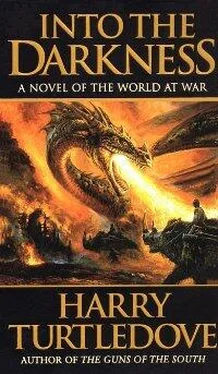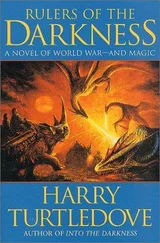As much by luck as by good aim, his beam caught the Gong square in the chest. Just for a moment, Leudast saw the enemy’s broad, staring face, made animal-like—at least to a clean-shaven Unkerlanter—by a bushy yellow beard. The fellow let out a grunt, more of surprise than of pain, and toppled.
“The stick,” Leudast muttered, and scurried over to grab it. He didn’t know how much power his own had left. This far from a ley line, with no first-rank mage close by, when that power was gone, it was gone. Good to have a second stick handy.
He scowled at the Gyongyosian’s body, from which rose a faint smell of burnt meat along with the latrine odor of suddenly loosed bowels. The bastard was already dead, sure as sure. A mage didn’t have to be of the first rank to draw energy from a sacrifice. Soldiers who gave themselves up to power their comrades’ sticks won the Star of Efficiency—posthumously, of course—but expending a captive was more efficient still.
It didn’t matter, not here. For one thing, he had no captive, only a corpse. For another, no mages, first-rank or otherwise, were around. He crawled back behind his boulder and waited for the Gyongyosians to press the attack.
For several minutes, they didn’t. Maybe they weren’t sure how much damage the dragon attack had done. Or maybe they weren’t any more enthusiastic about the war than Leudast was. He listened to somebody, presumably an officer, haranguing them in their unintelligible twittering language. Knowing what an Unkerlanter officer would say in such a spot, Leudast guessed the fellow was telling them they’d get worse from him than from their foes if they didn’t start moving.
Here they came, the fuzzy bastards, some of them blazing, others darting forward while the rest made the Unkerlanters keep their heads down. Leudast popped up, took a couple of blazes with his beam, and then ducked again before the Gongs could puncture him as he’d punctured their trooper.
When he heard more of them getting around to his right, he fell back. A beam came horrifyingly close to him, lighting up a rock just in front of his face. But then he was in good cover again, and blazing back at the enemy.
And then, rather to his own surprise, more Unkerlanters came moving up from the rear, shouting King Swemmel’s name as they advanced. The Gyongyosians shouted, too, in dismay. Their chance was gone, and they knew it. The reinforcements even had a small portable egg-tosser with them. How the Gongs howled when they were on the receiving end of eggshells full of light and fire!
“Forward, men!” an Unkerlanter officer shouted. “Let’s drive them out of the mountains and into the flat. King Swemmel and efficiency!”
As far as Leudast was concerned, thinking a couple of platoons of soldiers could drive Gyongyos out of the Elsung Mountains wasn’t very efficient. He lay panting behind his heap of rocks. He’d been in the mountains for a while. No overeager fool was going to get him killed, not when he’d just come through a skirmish in one piece. “Staying alive is efficient, too,” he muttered, and sat tight.
Fernao stood at the bow of the Leopardess as she bounded north and west across the waves from Setubal, the capital of Lagoas, toward the Algarvian port of Feltre. The mage felt harassed. Not only did he have to bear in mind the pattern of ley lines on the sea—harder to read than they were on land—but he also had to be alert for any trace of Sibian warships, and perhaps for those of Valmiera, too.
Captain Rogelio came up to him. “Anything?” he asked.
“No, sir.” Fernao shook his head, and felt the ponytail flip back and forth on his neck. Like most Lagoans, he was tall and on the lean side. In some lights, his hair was auburn; in others, a rich brown. His narrow eyes, with a fold of skin at the inner corners that made them look set at a slant, told of Kuusaman blood. “All seems as quiet as if we were still at peace.”
Rogelio snorted. “Lagoas is at peace, I’ll thank you to remember. It’s all the other fools who’ve thrown the world into the fire.” He twiddled at his mustache: he wore a big waxed swashbuckler, in Algarvian style.
“As if the world were at peace.” Fernao accepted the correction; like any mage worth his salt, he craved precision. After a moment, he went on, “In the Six Years’ War, we chose sides.”
“And a whole great whacking lot of good it did us, too,” the captain of the Leopardess said with another snort. “What did we get out of it? Thousands—tens, hundreds of thousands—dead, even more maimed, a war debt we’re just now starting to get out from under, half our shipping sunk—and you want to do it again? Here’s what I think of that.” He spat—carefully, over the leeward rail.
“I never said I wanted to do it again,” Fernao replied. “My older brother died in the woods in front of Priekule. I don’t remember much about him; I was only six or seven. I lost an uncle—my mother’s younger brother—and a cousin, and another cousin came home short a foot.” He shrugged. “I know it’s not anything special. Plenty of families in Lagoas have worse stories to tell. Too many families simply aren’t, after the Six Years’ War.”
“That’s the truth,” Rogelio said with an emphatic nod. Everything he did was emphatic; he aped Algarvian style in more than his mustache. “So why do you sound so cursed glum about staying at peace, then?”
“I’m not glum about our staying at peace,” Fernao said. “I’m glum about the rest of the world going back to war. All the kingdoms of eastern Derlavai suffered as much as we did.”
“And Unkerlant,” Rogelio put in. “Don’t forget Unkerlant.”
“Unkerlant is a kingdom of eastern Derlavai … in a manner of speaking,” Fernao said with a thin smile. The smile soon slipped. “Thanks to the Twinkings War, they hurt themselves worse than Algarve ever managed, and Algarve hurt them plenty.”
Rogelio’s lip curled scornfully. “They were efficient at hurting themselves.”
Fernao’s chuckle had a bitter edge. “King Swemmel will make the Unkerlanters efficient about the time King Gainibu makes the Valmierans shy.”
“But Gainibu has a little sense—as much as you can expect from a Valmieran, anyhow,” Rogelio said. “He doesn’t try to make his people into something they’re not.” The captain waved a hand. “There! You see, my friend? Between us, we’ve solved all the problems in the world.”
“All but one: how to get the world to pay any attention to us,” Fernao said. His sardonic streak made a good counter to Rogelio’s extravagances.
When it came to running the Leopardess, though, the captain was all business. “If we are sailing an evasive course, my sorcerous friend, should we not be shifting ley lines soon?”
“If we really wanted an evasive course, we would sail, with canvas and masts, as they did in the days of the Kaunian Empire,” Fernao said. “If we did that, we could slip by Sibiu close enough to spit, and we’d never be noticed.”
“Oh, aye, no doubt,” Rogelio said, arching his eyebrows. “And if a storm blew up at the wrong time, it’d fling us on to the Rocks of Cluj, too. No, thank you! They might have been men in those days, but they were madmen, if anybody wants to know what I think. Sailing by wind and by guess, without the earth’s energy matrix to draw on? You’d have to be a madman to try that.”
“No, just an ignorant man—or a yachtsman,” Fernao said. “Not being either of those myself…” He drew from around his neck an amulet of lodestone and amber set in gold. Holding it between the palms of his hands, he felt of the energy flowing through the ley line along which the Leopardess cruised. He could not have put into words the sensation that passed through him, but he understood what it meant. “Three minutes, Captain, perhaps four, before our line intersects the next.”
Читать дальше












